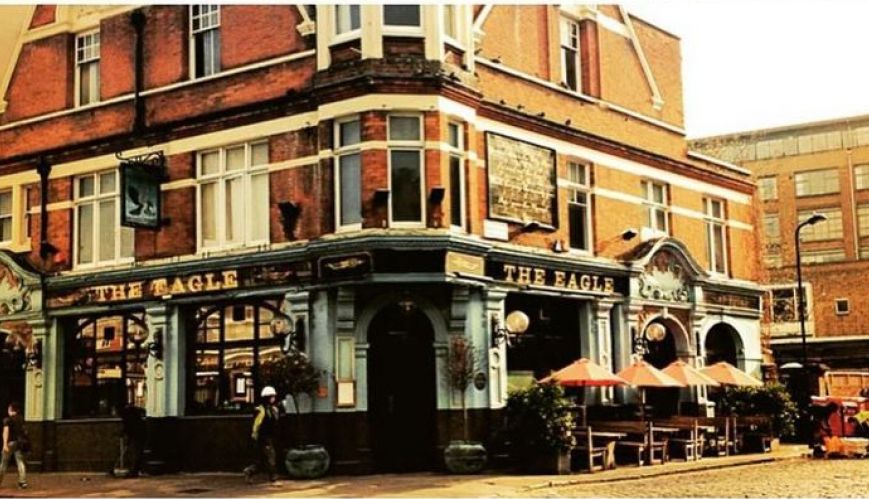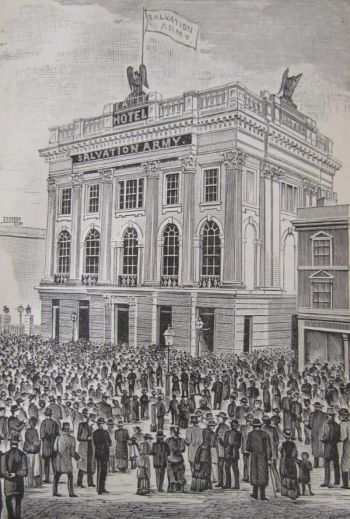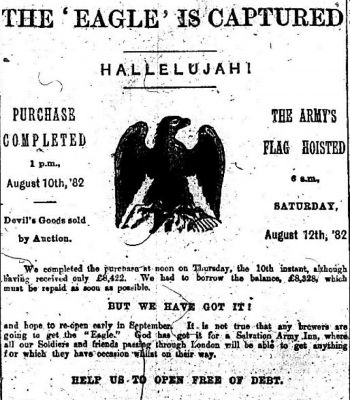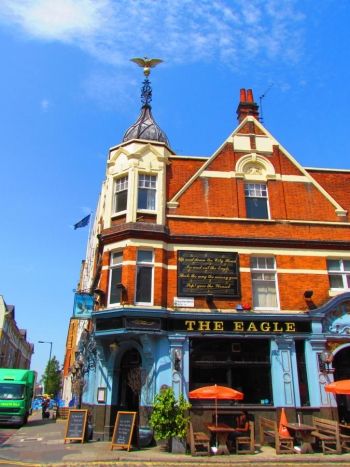William Booth owned a pub!

William Booth owned a pub!
By Garth R Hentzschel
This year marked the 135th anniversary of The Salvation Army’s invasion of the Eagle Tavern and Grecian Theatre in London. 
The Army’s founder, William Booth, described it as “the greatest triumph” to that point in time, yet there is surprisingly little written about the event.
Originally known as the Shepherd and Shepherdess Tavern, the building had become a landmark as early as 1806. By June 1818, the Shepherd and Shepherdess Tavern had become the Eagle Tavern.
In 1822, Thomas Rouse acquired the lease and would go on to renovate the site, making it one of the largest places of public entertainment in London.
During this period, the tavern also became the base for Henry Hunt, an activist and political agitator. He used the tavern for political meetings, dinners and protests, and in this way bought patronage and popularity.
The 1830s saw the Eagle Tavern prosper, with musicals, sporting activities such as boxing, a pleasure garden, the Grecian Theatre, a dance floor, billiard rooms, theme park rides and tourist attractions such as the coronation gate.
The entertainment also attracted literary attention; Charles Dickens visited the site and wrote about it in Miss Evans and the Eagle, and the nursery rhyme, Pop Goes the Weasel, is about the negative impact the Eagle Tavern was having on the population of London.
Upon Rouse’s retirement, Mr T. Clark took on the lease and the place quickly deteriorated. Two years later, he placed the lease on the market. 
William Booth, convinced that the Eagle’s locality would be a good place to “train future evangelists” and the Grecian Theatre an ideal building for a corps, sent an officer, dressed in disguise, to the auction, and on 10 August 1882, The Salvation Army purchased the 17-year lease on the property.
Following some renovations, the Grecian Corps and Eagle Temperance Hotel was opened on 21 September 1882. Around 10,000 people attended the first meeting, with another 30,000 gathered outside to demonstrate against the Army.
Despite this opposition, within months of opening the Grecian Corps had recorded 1800 seekers for salvation. Many Londoners, disgruntled by the loss of their hotel and theatre, tried, through legal action, to end the Army’s lease on the property.
The first court case saw a win for the Army, but a second case, arguing against the Army holding a liquor license without serving alcohol, was successful.
Subsequently, a sign on the door of the Eagle Tavern read: “William Booth, licensed to sell beer, &c., to be drunk on and off the premises.” Opponents took further, successful legal action to remove the tavern lease from the Army, but the loss of the Eagle, according to the Army, only increased the success of the Grecian Corps. 
Thousands would attend meetings, a Grecian “Slum” Corps was planted nearby by young people, and crime rates in the area decreased. However, in late 1898, the Grecian Corps, following further court cases, was eventually forced out of the building and conducted its meetings as open-air events.
In August 1900, the current Eagle Tavern was built and opened (pictured right). A year later, a police station was opened on the site of the old Grecian Theatre. The Grecian Corps became Hoxton Corps and is still an active place of Christian outreach.
* This article is an edited extract of a paper that appeared in the September edition of The Australasian Journal of Salvation Army History, by Garth R. Hentzschel. Read the full article.
Garth R. Hentzschel is President of The Salvation Army Historical Society (Brisbane Chapter).